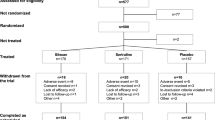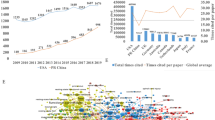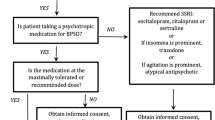Abstract
Geriatric depression is a relatively commonly occurring mental disorder. A subpopulation of depressed older adults are those who have engaged in or completed pharmacotherapy, yet continue to experience depressive symptoms. We review the prevalence, psychosocial effects, and treatment of residual symptoms of depression in older adults. Data from previous studies conducted by our group are presented to support our contention that residual symptoms of geriatric depression are treatable through psychosocial means.
Similar content being viewed by others
REFERENCES
Abramson, L. Y., Metalsky, G. I., and Alloy, L. B. (1989). Hopelessness depression: A theory-based subtype of depression. Psychol. Rev. 96: 358–372.
Ackerson, J., Scogin, F., McKendree-Smith, N., and Lyman, R. D. (1998). Cognitive bibliotherapy for adolescent depression. J. Consult. Clin. Psychol. 66: 685–690.
American Psychiatric Association (1994). Diagnostic and Statistical Manual of Mental Disorders, 4th edn., American Psychiatric Association, Washington, DC.
Anderson, B. L., Kiecolt-Glaser, J. K., and Glaser, R. (1994). A biobehavioral model of cancer stress and disease course. Am. Psychol. 49: 389–404.
Arean, P. A., Perri, M. G., Nezu, A. M., Schein, R. L., Christopher, F., and Joseph, T. X. (1993). Comparative effectiveness of social problem-solving therapy and reminiscence therapy as treatments for depression in older adults. J. Consult. Clin. Psychol. 61: 1003–10010.
Bazargan, M., and Barbre, A. R. (1994). The effects of depression, health status, and stressful life-events on self-reported memory problems among aged blacks. Int. J. Aging Hum. Dev. 38: 351–362.
Beck, A. T., Rush, J., Shaw, B., and Emery, G. (1979). Cognitive Therapy of Depression, Guilford, New York.
Blackburn, I. M., Bishop, S., Glen, A. I., Whalley, L. J., and Christie, J. E. (1981). The efficacy of cognitive therapy in depression: A treatment trial using cognitive therapy and pharmacotherapy, each alone and in combination. Br. J. Psychiatry 139: 181–189.
Broadhead, W. E., Blazer, D. G., George, L. K., and Tse, C. K. (1990). Depression, disability days, and days lost from work in a prospective epidemiologic survey. JAMA 264: 2524–2528.
Callahan, C. M., Hui, S. L., Nienaber, N. A., Musick, B. S., and Tierney, W. M. (1994). Longitudinal study of depression and health services use among elderly primary care patients. J. Am. Geriatr. Soc. 42: 833–838.
Cohn, C. K., Shrivastava, R., Mendels, J., Cohn, J. B., Fabre, L. F., Claghorn, J. L., Dessain, E. C., Itil, T. M., and Lautin, A. (1990). Double-blind, multicenter comparison of sertraline and amitriptyline in elderly depressed patients. J. Clin. Psychiatry 51B: 28–33.
Cole, A. J., Brittlebank, A. D., and Scott, J. (1994). The role of cognitive therapy in refractory depression. In Nolen, W. A., Zohar, J., Roose, S. P., and Amsterdam, J. D. (eds.), Refractory Depression: Current Strategies and Future Directions, Wiley, New York.
De Jong, R., Treiber, R., and Henrich, G. (1986). Effectiveness of two psychological treatments for inpatients with severe and chronic depressions. Cognit. Ther. Res. 10: 645–663.
Dew, M. A., and Bromet, E. J. (1991). Effects of depression on social support in a community sample of women. In Eckenrode, J. (ed.), The Social Context of Coping, Plenum Press, New York, pp. 189–211.
Dobson, K. S. (1989). Ameta-analysis of the efficacy of cognitive therapy for depression. J. Consult. Clin. Psychol. 57: 414–419.
Dworkin, R. H., Hartstein, G., Rosner, H. L., Walther, R. R., Sweeney, E. W., and Brand, L. (1992). A high-risk method for studying psychosocial antecedents of chronic-pain: The prospective investigation of herpes zoster. J. Abnorm. Psychol. 101: 200–205.
Fava, M., and Davidson, K. G. (1996). Definition and epidemiology of treatment resistant depression. Psychiatr. Clin. North Am. 19: 179–200.
Fava, G. A., Grandi, S., Zielezny, M., Canestrari, R., and Morphy, M. A. (1994). Cognitive behavioral treatment of residual symptoms in primary major depressive disorder. Am. J. Psychiatry 151: 1295–1299.
Fava, G. A., Grandi, S., Zielezny, M., Rafanelli, C., and Canestrari R. (1996). Four-year outcome for cognitive behavioral treatment of residual symptoms in major depression. Am. J. Psychiatry 153: 945–947.
Fava, G. A., Rafanelli, C., Grandi, S., Conti, S., and Belluardo, P. (1998). Prevention of recurrent depression with cognitive behavioral therapy: Preliminary findings. Arch. Gen. Psychiatry 55: 816–820.
Fava, G. A., Savron, G., Grandi, S., and Rafanelli, C. (1997). Cognitive-behavioral management of drug-resistant major depressive disorder. J. Clin. Psychiatry 58: 278–282.
Flint, A. J., and Rifat, S. L. (1996). The effect of sequential antidepressant treatment on geriatric depression. J. Affective Disord. 36: 95–105.
Floyd, M., and Scogin, F. (1998). Cognitive-behavior therapy for older adults: How does it work? Psychotherapy 35: 459–463.
Floyd, M., Scogin, F., McKendree-Smith, N., Floyd, D., and Rokke, P. (submitted). Cognitive therapy for depression: A comparison of individual psychotherapy and bibliotherapy for depressed older adults.
Friedhoff, A. J. (1994). Consensus panel report. In Schneider, L. S., Reynolds, C. F., Lebowitz, B. D., and Friedhoff, A. J. (eds.), Diagnosis and Treatment of Depression in Late Life: Results of the NIH Consensus Development Conference, American Psychiatric Press, Washington, DC.
Frisch, M. B. (1998). Quality of life therapy and assessment in health care. Clin. Psychol. Sci. Pract. 5: 19–40.
Gallagher, D., and Thompson, L.W. (1981). Depression in the Elderly: A Behavioral Treatment Manual, University of Southern California Press, Los Angeles.
Gallagher-Thompson, D., and Thompson, L. W. (1995). Psychotherapy with older adults in theory and practice. In Bonger, B., and Beutler, L. (eds.), Comprehensive Textbook of Psychotherapy Oxford University Press, New York, pp. 357–379.
Gallagher-Thompson, D., and Thompson, L.W. (1996). Applying cognitive-behavioral therapy to the psychological problems of later life. In Zarit, S. H., and Knight, B. G. (eds.), A Guide to Psychotherapy and Aging. American Psychological Association, Washington, DC.
Ganguli, M., Gilby, J., and Seeberg, E. (1995). Depressive symptoms and associated factors in a rural elderly population: The MoVIES project. Am. J. Geriat. Psychiatry 3: 144–160.
George, L. K. (1992). Community and home care for mentally ill older adults. In Birren, J., Sloane, R. B., and Cohen, G. D. (eds.), Handbook of Mental Health and Aging, 2nd edn., Academic Press, San Diego.
Hamilton, M. (1967). Development of a rating scale for primary depressive illness. Br. J. Soc. Clin. Psychol. 57: 536–544.
Hollon, S. D., Shelton, R. C., and Loosen, P. T. (1991). Cognitive therapy and pharmacotherapy for depression. J. Consult. Clin. Psychol. 59: 88–99.
Hooley, J. M., Orley, J., and Teasdale, J. D. (1986). Levels of expressed emotion and relapse in depressed patients. Br. J. Psychiatry 148: 642–647.
Ilardi, S., and Craighead, W. (1994). The role of nonspecific factors in cognitive-behavior therapy for depression. Clin. Psychol. Sci. Pract. 1: 138–156.
Jacobson, N., Dobson, K. S., Truax, P. A., Addis, M. E., Koerner, K., Gollan, J. K., Gortner, E., and Prince, S. E. (1996). A component analysis of cognitive-behavioral treatment for depression. J. Consult. Clin. Psychol. 64: 295–304.
Jamison, C., and Scogin, F. (1995). The outcome of cognitive bibliotherapy with depressed adults. J. Consult. Clin. Psychol. 63: 644–650.
Johnson, J., Weissman, M. M., and Klerman, G. L. (1992). Service utilization and social morbidity associated with depressive symptoms in the community. JAMA 267: 1478–1483.
Lewinsohn, P. M., Biglan, T., and Zeiss, A. (1976). Behavioral treatment of depression. In Davidson, P. (ed.), Behavioral Management of Anxiety, Depression, and Pain, Brunner/Mazel, New York, pp. 91–146.
Lewinsohn, P., Munoz, R., Youngren, M. A., and Zeiss, A. (1986). Control Your Depression, Prentice-Hall, Englewood Cliffs, NJ.
Mahapatra, S. N., and Hackett, D. (1997). A randomized, double-blind, parallel-group comparison of venlafaxine and dothiepin in geriatric patients with major depression. Int. J. Clin. Pract. 51: 209–213.
McCullough, J. B., and Lynch, M. S. (1993). Barriers to solutions: Service delivery and public policy in rural areas. J. Appl. Gerontol. 12: 388–403.
McFarland, B. H., Freeborn, D. K., Mullooly, J. P., and Pope, C. R. (1985). Utilization patterns among long-term enrollees in a prepaid group practice health maintenance organization. Med. Care 23: 1221–1233.
Miller, I. W., Bishop, S. B., Normal, W. H., and Keitner, G. I. (1985). Cognitive/behavioural therapy and pharmacotherapy with chronic, drug-refractory depressed inpatients: A note of optimism. Behav. Psychother. 13: 320–327.
Olfson, M., and Klerman, G. L. (1987). The treatment of depression: Prescribing practices of primary care physicians and psychiatrists. J. Family Pract. 34: 627–635.
Paykel, E. S., Scott, J., Teasdale, J. D., Johnson, A. L., Garland, A., Moore, R., Jenaway, A., Cornwall, P. L., Hayhurst, H., Abbott, R., and Pope, M. (1999). Prevention of relapse in residual depression by cognitive therapy: A controlled trial. Arch. Gen. Psychiatry 56: 829–835.
Reynolds, C. F., Frank, E., Perel, J. M., Imber, S. D., Cornes, C., Miller, M. D., Mazumdar, S., Houck, P. R., Dew, M. A., Stack, J. A., Pollock, B. G., and Kupfer, D. J. (1999). Nortriptyline and interpersonal psychotherapy as maintenance therapies for recurrent major depression: A randomized controlled trial in patients older than 59 years. JAMA 281: 39–45.
Robinson, P. (1996). Living Life Well: New Strategies for Hard Times, Context Press, Reno, NV.
Robinson, P. (1998). Behavioral health services in primary care: A new perspective for treating depression. Clin. Psychol. Sci. Pract. 5: 77–89.
Robinson, L. A., Berman, J. S., and Neimeyer, R. A. (1990). Psychotherapy for the treatment of depression: A comprehensive review of controlled outcome research. Psychol. Bull. 108(1): 30–49.
Rowan, P. J., Davidson, K., Campbell, J., and MacLean, D. R. (1999). Depression and medical care utilization: Stronger relation for older adults. Paper presented at the National Conference on Health Statistics, Washington, DC, August, 1999.
Scheidt, R. J. (1985). The mental health of the aged in rural environments. In Cowart, R. T., and Lee, G. R. (eds.), The Elderly in Rural Society, Springer, New York.
Schmidt, M. M., and Miller, W. R. (1983). Amount of therapist contact and outcome in a multidimensional depression treatment program. Acta Psychiatr. Scand. 67: 319–332.
Scogin F., Jamison, C., and Gochneaur, K. (1989). Cognitive and behavioral bibliotherapy for mildly and moderately depressed older adults. J. Consult. Clin. Psychol. 57: 403–407.
Scogin, F., and McElreath, L. (1994). Efficacy of psychosocial treatments for geriatric depression: A quantitative review. J. Consult. Clin. Psychol. 62: 69–74.
Shapiro, D. A. (1981). Comparative credibility of treatment rationales: Three tests of expectancy theory. Br. J. Clin. Psychol. 20: 111–122.
Sharan, P., and Saxena, S. (1998). Treatment-resistant depression: Clinical significance, concept and management. Natl. Med. J. India 11: 69–79.
Simon, G., Ormel, J., VonKorff, M., and Barlow, W. (1995). Health care costs associated with depressive and anxiety disorders in primary care. Am. J. Psychiatry 152: 352–357.
Smith, M., and Buckwalter, D. C. (1993). Mental health care for rural seniors. Health Prog. 74: 52–70.
Stoudemire, A., Hill, C. D., Morris, R., and Dalton, S. T. (1995). Improvement in depression-related cognitive dysfunction following ECT. J. Neuropsychiatry Clin. Neurosci. 7: 31–34
Teri, L., Logsdon, R. G., Uomoto, J., and McCurry, S. M. (1997). Behavioral treatment of depression in dementia patients: A controlled clinical trial. J. Gerontol. B Psychol. Sci. Soc. Sci. 52B: 159–166.
Thase, M. E. (1997). Psychotherapy of refractory depressions. Depr. Anxiety 5: 190–201.
Thase, M. E., and Howland, R. (1994). Refractory depression: Relevance of psychosocial factors and therapies. Psychiatr Ann. 24: 232–240.
Thase, M. E., Howland, R. H., and Friedman, E. S. (1998). Treating antidepressant nonresponders with augmentation strategies: An overview. J. Clin. Psychiatry 59(Suppl. 5): 5–15.
Thase, M. E., and Rush, J. A. (1995). Treatment-resistant depression. In Bloom, F. E., and Kupfer, D. J. (eds.), Psychopharmacology: The Fourth Generation of Progress, Raven Press, New York. pp. 1081–1097.
Thase, M. E., and Rush, A. J. (1997). When at first you don't succeed: sequential strategies for antidepressant nonresponders. J. Clin. Psychiatry 58(Suppl. 13): 23–29.
Thompson, L. W., Coon, D. W., Gallagher-Thompson, D., Sommer, B., and Koin, D. (in press). Comparison of desipramine and cognitive/behavioral therapy in the treatment of elderly outpatients with mild to moderate depression. Am. J. Geriat. Psychiatry
Thompson, L. W., Gallagher, D., and Breckenridge, J. S. (1987). Comparative effectiveness of psychotherapies for depressed elders. J. Consult. Clin. Psychol. 55: 385–390.
Tollefson, G. D., Bosomworth, J. C., Heiligenstein, J. H., Potvin, J. H., and Holman, S. (1995). A double-blind, placebo-controlled clinical trial of fluoxetine in geriatric patients with major depression: The fluoxetine collaborative study group. Int. Psychogeriat. 7: 89–104.
Tweed, D. (1993). Depression-related impairment: Estimating concurrent and lingering effects. Psychol. Med. 23: 373–386.
Unützer, J., Patrick, D. L., Simon, G., Grembowski, D., Walker, E., Rutter, C., and Katon, W. (1997). Depressive symptoms and the cost of health services in HMO patients aged 65 years and older: A 4-year prospective study. J. Am. Med. Assoc. 277: 1618–1623.
Vitaliano, P. P., Dougherty, C. M., and Siegler, I. C. (1994). Biopsychosocial risks for cardiovascular disease. In Abeles, R. P., Gift, H. C., and Ory, M. G. (eds.), Aging and Quality of Life, Springer, New York.
Wells, K. B., Steward, A., Hays, R. D., Burnam, A., Rogers, W., Daniels, M., Berry, S., Greenfield, S., and Ware, J. (1989). The functioning and well-being of depressed patients: Results from the Medical Outcomes Study. J. Am. Med. Assoc. 262: 914–919.
Wilson, K. C. M., Scott, M., Abou-Saleh, M., Burns, R., and Copeland, J. R. M. (1995). Long-term effects of cognitive-behavioural therapy and lithium therapy on depression in the elderly. Br. J. Psychiatry 167: 653–658.
Wollersheim, J., and Wilson, G. (1990). Group treatment of unipolar depression: A comparison of coping, supportive, and delayed treatment groups. Prof. Psychol. Res. Pract. 22: 496–502.
Zarit, S. H., Gallagher, D., and Kramer, N. (1981). Memory training in the community aged: Effects of depression, memory complaint, and memory performance. Educ. Gerontol. 6: 11–27.
Author information
Authors and Affiliations
Rights and permissions
About this article
Cite this article
Scogin, F., Shackelford, J., Rohen, N. et al. Residual Geriatric Depression Symptoms: A Place for Psychotherapy. Journal of Clinical Geropsychology 7, 271–283 (2001). https://doi.org/10.1023/A:1011396108627
Issue Date:
DOI: https://doi.org/10.1023/A:1011396108627




